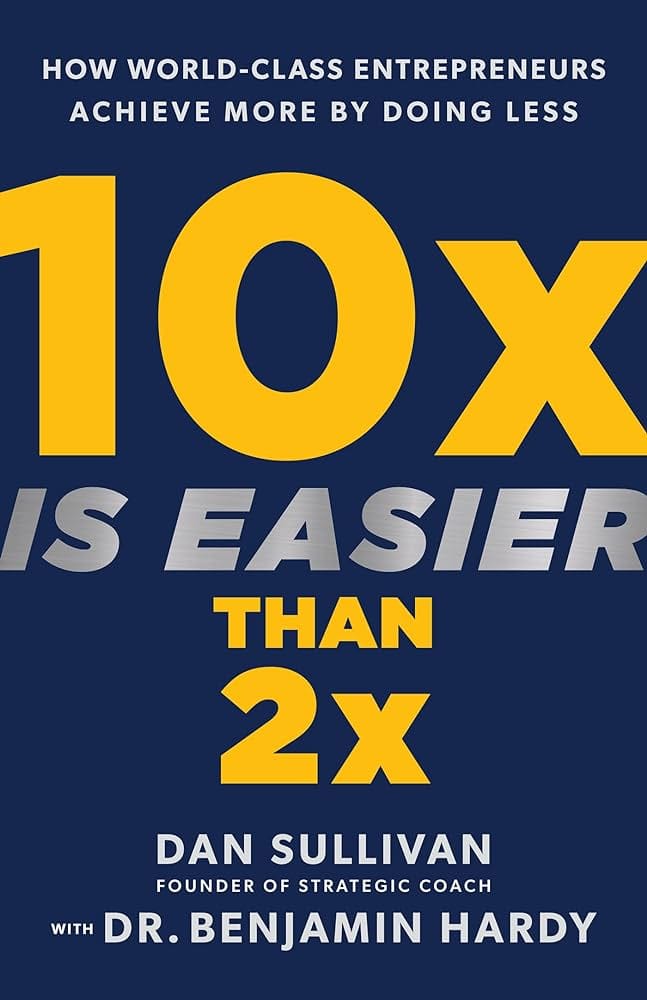10x Is Easier Than 2x

The book “10x Is Easier Than 2x” has recently gained traction in entrepreneurial circles, especially in communities like twitter and facebook. It's likely that in a few years, this book will make its way into the "memoirs" of many entrepreneurs. I first heard about it on "Silicon Valley Wang Chuan's" Twitter, but didn't read it right away. However, seeing its growing influence, I decided to dive into it with the help of ChatGPT and Kimi Chat.
1. Why is 10x Easier than 2x?
Initially, I was puzzled by this concept. How can 10x be easier than 2x? After reading the book, I realized the answer might be hidden in a quote by Jet Li:
"I never believed that just because I worked the hardest, I became a martial arts champion. Absolutely not. If you're just a machine doing what you're told, then why don't all 30 students in the class become champions if they all do the same thing? I always do what others don't. When my classmates train 1000 times without thinking, I think: Why not train 200 times but make those 200 the best? It's all about 'insight'."
Simply put, instead of following the crowd and tackling 10 tasks at once, focusing on just 1 or 2 key things can lead to outstanding results. The examples in the original book, often from Western contexts, felt a bit distant. Jet Li's perspective as a Chinese martial arts icon resonated more with me.
When pursuing 2x goals, we often end up juggling many tasks, leading to superficial work on each. This shallow approach can impact the quality of our results. In contrast, focusing on fewer tasks with a 10x mindset allows us to make significant breakthroughs and become experts and leaders in our field. Specialization helps us solve intricate and specific problems, making us stand out in a competitive market.
Moreover, achieving 10x growth often requires innovative and breakthrough thinking. This means stepping out of conventional frameworks and finding new, more effective ways to reach our goals. Such innovation stems from deep thinking and a thorough understanding of key areas, rather than merely putting in more effort blindly.
2. How Can We Focus and Achieve 10x Growth?
Compared to the book's vague "slogans," I prefer the practical insights from Paul Graham, a prominent figure in the American internet scene. In his latest blog, "Superlinear Returns," he outlines:
- Strive for Excellence: To leverage superlinear returns, the best approach is to produce outstanding results. How good should these results be to be considered "excellent"? I align with a viewpoint from The Product Thinking Blog, which suggests that the ultimate goal of creation is to define a new category, not just optimize existing content. Consumers fall in love not with us but with the category we create.For example, Meng Yan is synonymous with "value investing" due to his continuous five-year effort in publishing articles and podcasts on the topic. When the Changqian Account launched on Zhiyou, it garnered significant recognition due to his established presence in the field. Excellence means becoming synonymous with a specific category, so whenever people think of that niche, they immediately think of us.
- Master Every Aspect: To stand out, we need to excel in almost every area that impacts our work. In a world of superlinear returns, knowing our interests and finding opportunities to pursue them is crucial.
- Focus on Skills, Not Just Effort: Achieving great results is about more than just hard work. Here are some methods:
- Choose work you're naturally good at and deeply interested in.
- Develop the habit of working on independent projects, driven by ambition rather than assignments.
- Work hard but avoid burnout, which ultimately leads us to the forefront of knowledge. These fields may seem flat, but they are full of cracks upon closer inspection.
- Take on as much risk as possible; if we've never failed, we might be too conservative.
- Seek out the best partners.
- Cultivate refined taste by learning from the best examples.
- Stay honest, especially with ourselves.
- Pay attention to exercise, diet, and sleep, and stay away from harmful substances.
- When in doubt, follow your curiosity. It never deceives and knows better than we do what's worth pursuing.
- Embrace the Challenge: Entering a field where a few top players dominate can be daunting. Some people actively seek this competition, but it's not necessary. As long as we're intelligent and curious, we'll naturally enter such fields. Our curiosity won't let us settle for mundane problems, and those fascinating issues often yield superlinear returns, or 10x growth, even if they don't initially belong to any established field.




